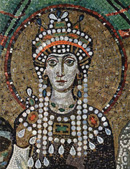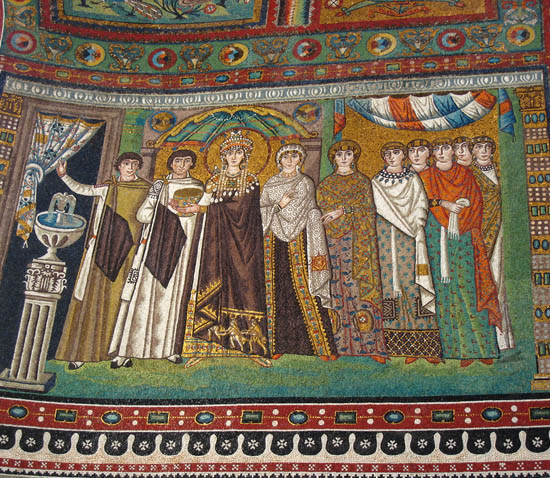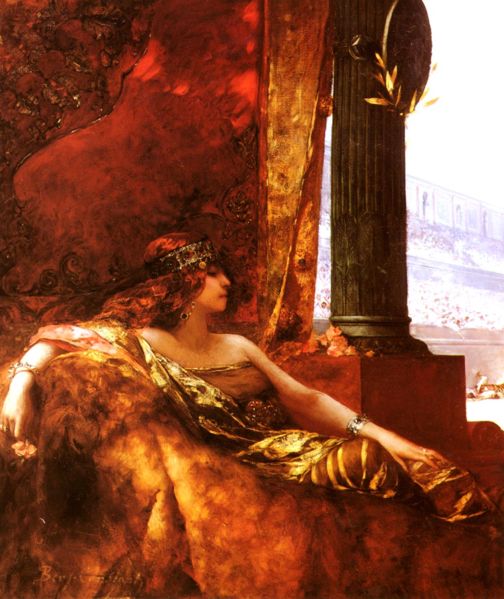Theodora - Empress and Courtesan

In the Orthodox, Syrian and Oriental churches today, Byzantine Empress Theodora is a saint. But among Roman Catholics she is dismissed as an unrepentant ex-courtesan and a heretic, who argued that Jesus was divine and not human at all. It doesn't help that she convinced the Emperor Justinian to change the marriage laws so she could marry him, she practiced and defended abortion and adultery, and generally advanced the rights of women, including the right to divorce, the right to own and inherit property, and the safety of prostitutes and poor women. It provoked some savage reactions...
Theodora stripped in front of the audience and lay on the floor. Slaves scattered "grains of barley from above into the calyx of this passion flower, whence geese, trained for the purpose, would next pick the grains one by one with their bills and eat.
"On the field of pleasure she was never defeated. Often she would go picnicking with ten young men or more, in the flower of their strength and virility, and dallied with them all, the whole night through. When they wearied of the sport, she would approach their servants, perhaps thirty in number, and fight a duel with each of these; and even thus found no allayment of her craving.
"Once, visiting the house of an illustrious gentleman, they say she mounted the projecting corner of her dining couch, pulled up the front of her dress, without a blush, and thus carelessly showed her wantonness. And though she flung wide three gates to the ambassadors of Cupid, she lamented that nature had not similarly unlocked the straits of her bosom, that she might there have contrived a further welcome to his emissaries."
English translations like the one above are hilarious because they are so florid. For centuries such material was considered pornographic and couldn’t be translated into English from Greek.
It was also propaganda. The original is by the historian Procopius, whose The Secret History (Anekdota, i.e. “unpublished things”) is the most important contemporary source of information about the reign of Justinian and Theodora. Much of it is embellished and it could never be published during his own lifetime, for Procopius was no fan of Theodora.

The above mosaic image of Theodora and her attendants is from Ravenna, Italy, in the church of San Vitale. It was built in 574 by Justinian, decades after her death. Its counterpart mosaic shows Justinian and his attendants. As a patron of the Church, Theodora is entitled to the halo over her head and she seems to be holding a Eucharist bowl. What is more mysterious is why there are Three Magi bearing gifts on her dress. Does this imply an association between Theodora and the Virgin Mary? In one sense symbolically she is the mother of the Church, but it also seems likely the mosaic recognizes that Theodora actively promoted the Cult of the Virgin Mary during her lifetime.
Below is L'Imperatrice Theodora au Colisée, by 19th C. French Orientalist painter Jean-Joseph Benjamin-Constant. I don't know the date of the painting. Is that the Hippodrome in the background?

